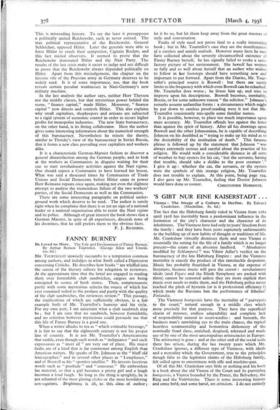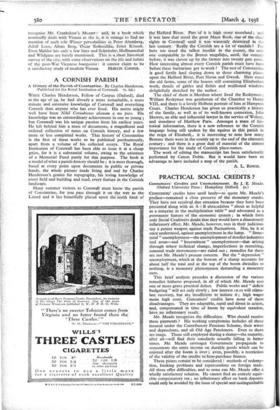'S GIBT NUR EINE KAISERSTADT
Vienna : The Image of a Culture in Decline. By Edward Crankshaw. (Macmillan. 8s. 6d.)
THE fact that the Habsburg family ruled in Vienna from 1282 until 1918 has inevitably been a predominant influence in the formation of the city's character and the character of its inhabitants. The Viennese have had only 20 years' freedom from the family : and they have been years supremely unfavourable to the building up of new habits of thought or traditions of life. Mr. Crankshaw virtually dismisses them and sees Vienna as essentially the setting for the life of a taniily which is no longer present—the estate of an absentee landlord. " Absolutism modified by Schlamperei was ViittOr Adler's verdict on the bureaucracy of the late Habsburg Empire : and the Viennese mentality is exactly the product of this ramshackle despotism. Music has probably flourished in Vienna, at the expense of literature, because music will pass the censor : revolutionary ideils- (and Figaro and the Ninth Symphony are packed with - them). cannot be censored unless they are more explicit than music ever needs to make them, and the Habsburg police never 'reached the pitch of hysteria (or is it professional efficiency ?) which 'made the Russians ban the performance of Sibelius' Finlandia.
The Viennese bourgeoisie have the mentality of " purveyors to the court," natural enough in a middle class which arose, precisely for that purpose. They have the superficial charm of manner, endless adaptability and complete lack of responsibility natural to court-toadies : and beneath, the business man's unwinking eye to the main chance, the typical heartless sentimentality and bottomless dishonesty of the nominally freed slave, enriched, despised, tolerated and made use of by one of the most unscrupulous aristocracies in Europe. The aristocracy is gone : and at the other end of the social scale there has arisen, during the last twenty years which Mr. Crankshaw ignores, a different type of Viennese, with ideals and a mentality which the Goverrunent,,true to the principles though false to the legitimist claims of-the Habsburg family, felt called upon to exterminate with rifle and machine-gun.
Of all this Mr. Crankshaw says little or nothing and his book is a book about the old Vienna of the Court and its purveying bourgeoisie, a Vienna bounded by the Prater, the Belvedere, the Ring and the Votivkirche. There is some interesting history and-some bold; and some banal; art- criticism. -I do. not entirely recognise Mr. CrankshalV's Mozart : and; a hook which nominally deals with Vienna as she is it is strange to find no mention of such echt Wiener personalities as Peter Altenperg, Adolf Loos,. Alban Berg, -0S-Ear "KolcciiChii; Brnst ICienek. Even Mahler his only 'a few lines and clinitzler, Hoffmansthal and Wildgans are barely mentioned. This is ashort historical survey Of The city, with some observations on the life and habits of the post-War Viennese bourgeoisie: it cannot claim to he a satisfactory study of-modern Vienna. MetartN"C0011/01..







































































 Previous page
Previous page